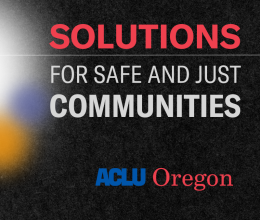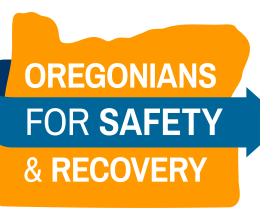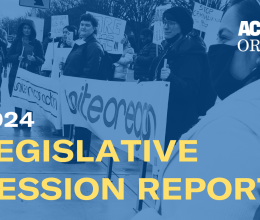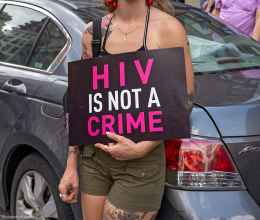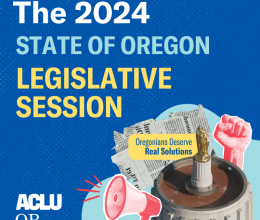
PORTLAND, Ore. — Yesterday, the ACLU of Oregon sent a letter to Representative Jason Kropf and Senator Kate Lieber, co-chairs of the Joint Committee on Addiction and Community Safety Response (“Joint Committee”), Speaker Dan Rayfield, other state legislators, and the Governor’s Office. The letter set out very serious concerns about HB 4002 including:
- Forthcoming changes to the bill are more severe and functionally similar to the regressive, harsh criminalization policies pushed by the so-called “Fix and Improve Ballot Measure 110” interest group;
- In developing HB 4002 and its amendments, legislative leadership failed to meaningfully engage with all necessary stakeholders and constituents, including lawyers and advocates for civil rights and liberties and potentially even other branches and agencies of state government which will be severely impacted by the bill;
- HB 4002’s process and content show disdain for values such as civil rights and liberties, racial justice, and sound science-based public policy making, as well for the people who have been historically and disproportionately excluded, marginalized, and punished in this state for the health condition of addiction.
Sandy Chung, Executive Director of the ACLU of Oregon: “Real solutions to drug addiction are more treatment, housing, prevention education, non-police mobile crisis teams, and community revitalization efforts. Criminalization is not a real solution. It is a false promise that will inevitably result in more overdose deaths in the Oregon communities that most desperately need access to care. People will die, not only on our streets and in our homes, but in our jails and prisons. Oregon’s legislative leadership is digging a deep, unconscionable, and costly trench of human suffering by recriminalizing Oregonians experiencing drug addiction.”
Jessica Maravilla, Policy Director of the ACLU of Oregon: “The ACLU of Oregon has repeatedly seen the legislative process underlying HB 4002 ignore the expertise and experiences of our Black, Indigenous, and People of Color partner organizations and communities, researchers and experts, on-the-ground treatment providers, and any organization or person who disagrees with the state addressing drug addiction as a criminal issue because it is a health issue. We’ve been told flat out that our state’s return to criminalization for people experiencing addiction is not up for debate. No matter on what side of the debate one falls, the concerns we’ve shared with legislators demonstrate incredibly troubling and significant process breaches with HB 4002 that should give serious pause to anyone who cares about democracy and integrity.”
Kelly Simon, Legal Director of the ACLU of Oregon: “Reports about the next changes to HB 4002 indicate that deflection now will be merely optional for each county instead of required – and may even have levels of discretion for local police and sheriffs’ departments. What this means is that someone addicted to drugs in one county may be arrested and left to suffer and potentially die in jail, while a person addicted to drugs in the next county over might be offered access to deflection and treatment services. Geography-based access to justice is no justice at all. Lawmakers also continue to ignore the fact that there will be no public defense attorneys available any time soon for the likely thousands of new cases that recriminalization will inject into the criminal system. We expect that, in practice, HB 4002 won’t be much different from the regressive, harsh policies pushed by the so-called ‘Fix and Improve Ballot Measure 110’ interest group, which is led by the former head of Oregon prisons and funded by billionaires.”
###
